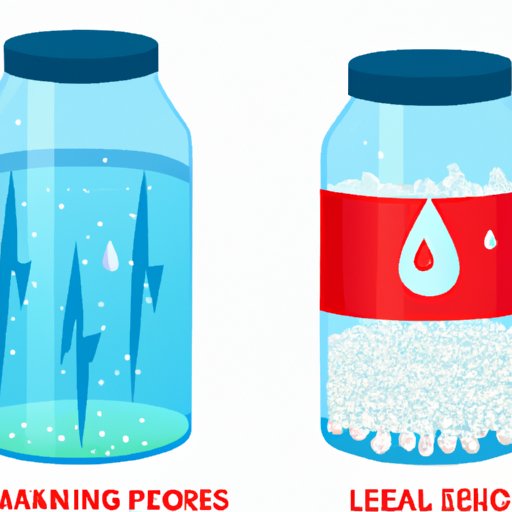
Introduction
Water weight refers to the extra water that can accumulate in your body and cause bloating and swelling. Our bodies are made up of 60% water, and water weight can fluctuate by several pounds throughout the day. Understanding water weight is crucial in managing your overall health and well-being. In this article, we will explore the causes of water weight, how to calculate it, and practical tips to reduce it.
A. Explanation of water weight and its effects on the body
Water weight is the excess water that has built up in your body tissues, blood, and organs. It can cause uncomfortable swelling and bloating in different parts of the body, including the arms, legs, and stomach. Water weight can also affect your weight and lead to the appearance of sudden weight gain.
B. Importance of understanding water weight and how to manage it
Managing water weight is essential for your overall health and wellness. Prolonged water retention can lead to increased blood pressure, strain on the heart and kidneys, and poor circulation. Understanding water weight and how to manage it can help you maintain a healthy weight, reduce bloating and swelling, and prevent health complications.
C. Preview of article topics
In this article, we will explore what affects water weight, how to calculate it, how to reduce it and how to monitor it over time.

II. The Ultimate Guide to Understanding Water Weight
A. Definition and causes of water weight
Water weight can be caused by several factors, including eating high-sodium foods, not drinking enough water, and hormonal changes. Certain medications and medical conditions can also cause water retention.
B. Effects of water weight on the body
Water weight can cause bloating, swelling, weight gain, and discomfort. It can strain the heart and kidneys and lead to complications, including high blood pressure and poor circulation.
C. How much water weight is normal and when it becomes a problem
A person can carry 2-4 pounds of water weight per day. Anything above that could indicate an issue with water retention. If you are concerned about your water weight levels, consider consulting a health professional.
III. How to Calculate Your Water Weight: A Comprehensive Guide
A. Methods to calculate water weight
You can calculate your water weight using various methods, including bioelectrical impedance analysis, water displacement measurements, and specialized scales.
B. Importance of knowing your water weight numbers
Knowing your water weight numbers can help you better understand and manage your weight and overall health.
C. How to track progress in reducing water weight
You can track your progress in reducing water weight using a journal, app, or chart. This can help you stay motivated and focused on achieving your goals.
IV. 5 Surprising Factors That Affect Your Water Weight
A. Hormones and water retention
Hormonal changes, such as those during menstruation or menopause, can cause water retention and bloating.
B. Exercise and dehydration
Exercising can cause water loss, leading to dehydration and water retention. It is crucial to stay hydrated during exercise.
C. Inflammation and its effects on water weight
Inflammation caused by an injury or medical condition can cause water retention and swelling.
D. Medications and their effects on water weight
Some medications, such as anti-inflammatories, blood pressure medications, and antidepressants, can cause water retention.
E. Genetics and its role in water weight
Genetics can play a role in how your body retains and loses water weight.
V. Debunking Water Weight Myths: What You Need to Know
A. The truth about “water weight diets”
“Water weight diets” or fad diets that claim to help you lose water weight quickly are generally unhealthy and ineffective. They can cause dehydration and disrupt your metabolism.
B. The impact of caffeine and alcohol on water weight
Caffeine and alcohol can cause dehydration and water retention. It is essential to consume them in moderation and stay hydrated.
C. The role of sweat and its effects on water weight
Sweating can cause water loss and temporary weight loss, but it is not an effective way to manage water weight in the long term.
D. Understanding the difference between water weight and fat loss
Water weight fluctuates and can confuse you about your progress in losing or gaining weight. Fat loss, on the other hand, is a more stable indicator of your weight loss efforts.
VI. The Impact of Salt and Carbs on Your Water Weight
A. Explanation of how salt and carbs contribute to water weight gain
Salt and carbs can cause water retention due to their effects on the body’s fluid levels. Excess intake of salt can lead to high blood pressure, and overeating carbs can lead to an insulin spike, causing fluid retention.
B. The importance of balancing salt and carb intake
It is essential to balance salt and carb intake to manage water weight effectively. Reducing salt intake and choosing healthier carb options can help reduce water retention.
C. Tips to manage salt and carb intake for water weight management
Some tips to manage salt and carb intake include reading labels carefully, flavoring food with herbs and spices instead of salt, avoiding processed food, and limiting carb intake to healthy sources such as whole grains and vegetables.
VII. Practical Tips to Reduce Water Weight and Feel Lighter
A. Hydration and its importance in managing water weight
Staying hydrated is essential in managing water weight. Drinking enough water can help flush out excess fluids and reduce bloating and swelling.
B. Foods to eat and avoid to reduce water weight
Eating foods rich in potassium, such as bananas and spinach, and avoiding high-salt foods can help reduce water retention.
C. Lifestyle changes that can help reduce water weight
Making lifestyle changes, such as reducing stress levels, getting enough sleep, and exercising regularly, can help reduce water retention.
D. Natural remedies to reduce water weight
Natural remedies, such as dandelion tea and magnesium supplements, can help reduce water retention. However, consult with a healthcare provider before using any new supplements or remedies.
VIII. How to Monitor Your Water Weight Over Time
A. Importance of regular monitoring to track progress
Ongoing monitoring of water weight is essential to track progress in managing water retention effectively.
B. Recommended frequency of monitoring
It is recommended to monitor water weight weekly or daily, depending on your goals and health needs.
C. Tools and methods to monitor water weight
You can use tools such as scales, body composition monitors, and specialized apps to monitor water weight accurately.
D. What to do if you see a sudden increase in water weight
If you notice a sudden increase in water weight, it is essential to consult with your healthcare provider to rule out any underlying medical conditions.
IX. Conclusion
of key points
Water weight is the extra water that can accumulate in your body and lead to bloating and swelling. Hormones, exercise, diet, and genetics can all play a role in water retention. Knowing your water weight numbers and taking steps to manage it is crucial for your overall health and well-being.
B. Reinforcement of the importance of water weight management
Managing water weight can help you maintain a healthy weight, reduce bloating and swelling, and prevent health complications.
C. Final thoughts and advice.
A balanced diet and a healthy lifestyle, including regular exercise and stress management, are essential in managing water weight effectively. Be patient and stay consistent in making lifestyle changes to achieve your health goals.





